(完整版)初中英语构词法
- 格式:doc
- 大小:39.87 KB
- 文档页数:7
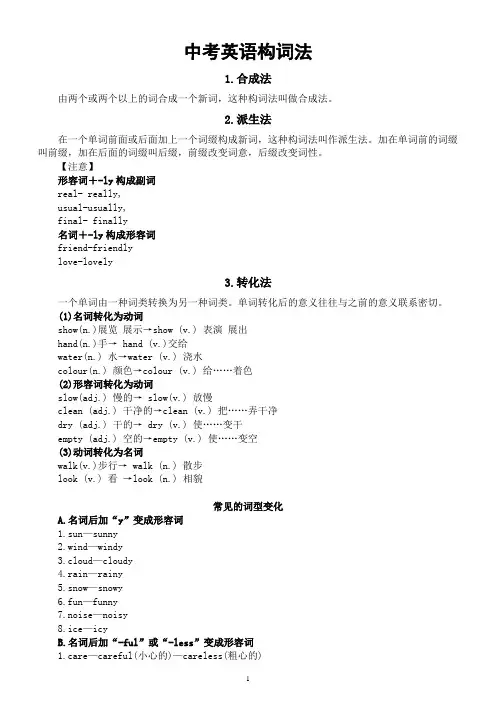
中考英语构词法1.合成法由两个或两个以上的词合成一个新词,这种构词法叫做合成法。
2.派生法在一个单词前面或后面加上一个词缀构成新词,这种构词法叫作派生法。
加在单词前的词缀叫前缀,加在后面的词缀叫后缀,前缀改变词意,后缀改变词性。
【注意】形容词+-ly构成副词real- really,usual-usually,final- finally名词+-ly构成形容词friend-friendlylove-lovely3.转化法一个单词由一种词类转换为另一种词类。
单词转化后的意义往往与之前的意义联系密切。
(1)名词转化为动词show(n.)展览展示→show (v.) 表演展出hand(n.)手→ hand (v.)交给water(n.) 水→water (v.) 浇水colour(n.) 颜色→colour (v.) 给……着色(2)形容词转化为动词slow(adj.) 慢的→ slow(v.) 放慢clean (adj.) 干净的→clean (v.) 把……弄干净dry (adj.) 干的→ dry (v.) 使……变干empty (adj.) 空的→empty (v.) 使……变空(3)动词转化为名词walk(v.)步行→ walk (n.) 散步look (v.) 看→look (n.) 相貌常见的词型变化A.名词后加“y”变成形容词1.sun—sunny2.wind—windy3.cloud—cloudy4.rain—rainy5.snow—snowy6.fun—funny7.noise—noisy8.ice—icyB.名词后加“-ful”或“-less”变成形容词1.care—careful(小心的)—careless(粗心的)e—useful(有用的)—useless(无用的)3.help-helpful(有帮助的)-helpless(无帮助的)4.harm-harmful(有害的)-harmless(无害的)C. 名词后加“-ern”变成形容词1.east—eastern(东方的)2.west—western(西方的)3.south—southern(南方的)4.north—northern(北方的)D.名词后加“-al”变成形容词1.person—personal (个人的)cation—educational(有教育意义的)3.tradition—traditional(传统的)4.medicine—medical(医学的)E.名词后加“-ed”或“d”变成形容词1.talent—talented(有才能的)2.balance—balanced(均衡的)H.名词后加“-en”变成形容词1.wool—woollen(羊毛的)2.wood—wooden(木制的)I.名词转化为形容词的不规则变化1.energy—energetic (有活力的)2.athlete—athletic(体育运动的)3.hunger—hungry (饥饿的)4.pride—proud(自豪的)5.death—dead (死的)6.science—scientific (科学的)7.knowledge—knowledgeable (有知识的)8.anger—angry (生气的)9.Africa—African (非洲的)10.America—American(美国的) 11.Brazil—Brazilian(巴西的)12.Canada—Canadian(加拿大的)13.Italy—Italian(意大利的)14.Russia—Russian(俄罗斯的)15.Swede—Sweden(瑞士的)16.France—French(法国的)17.China—Chinese(中国的)18.England—English(英国的)19.Japan—Japanese (日本的)20. Britain—British (英国的)J.动词变名词1.teach—teacher (教师)2.drive—driver(司机)3.write—writer(作家)4.dance—dancer(舞蹈家)5.win—winner (获胜者)6.run—runner(赛跑者)7.visit—visitor (参观者)8.invent—inventor(发明家)9. translate—translator(翻译家)cate—educator(教育家)11. describe—description(描述) 12.predict—prediction(预言)13.collect—collection(收藏)14.decide—decision(决定)15.build—building(建筑物)16.mean—meaning(意思)17.die—death(死亡)18.fly—flight (飞行)19.know—knowledge(知识)20.please—pleasure(高兴)21. pronounce—pronunciation(发音)22.mix—mixture(混合物)K. 动词变形容词1.please-pleasing(令人高兴)-pleased(感到高兴的)2.surprise-surprising(令人惊讶的)-surprised(感到惊讶的)3.excite-exciting(令人兴奋的)—excited(感到兴奋的)4.interest-interesting(令人感兴趣的)-interested(感兴趣的)5.worry-worrying(令人担忧的)-worried(感到担忧的)(类似单词有:amaze, annoy, bore, disappoint, embarrass, frustrate, relax, terrify, thrill, tire等)L.形容词的变化1)形容词变副词quick—quickly(迅速地)strong—strongly(强烈地)heavy—heavily(重重地)angry—angrily(生气地)healthy—healthily(健康地)noisy—noisily(吵闹地)terrible—terribly(可怕地)possible—possibly(可能地)2)形容词变名词kind—kindness(善良)happy—happiness(幸福)warm—warmth(温暖)safe—safety(安全)confident—confidence(信心)important—importance(重要性)different—difference(差异)true—truth(真理)long—length(长度)honest—honesty(诚实)。
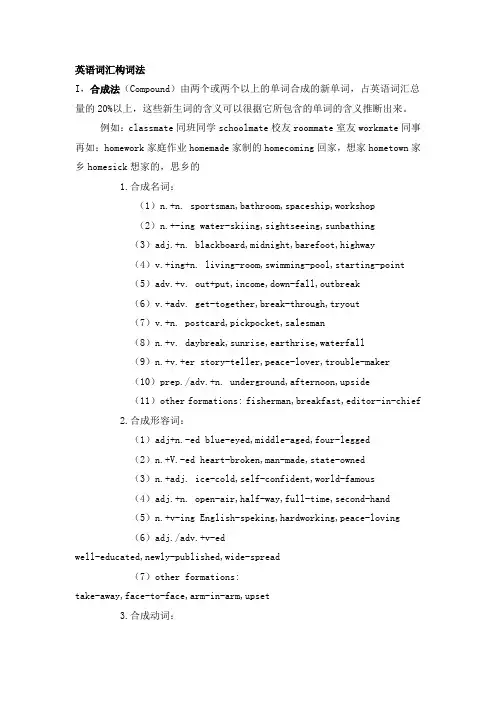
英语词汇构词法I,合成法(Compound)由两个或两个以上的单词合成的新单词,占英语词汇总量的20%以上,这些新生词的含义可以很据它所包含的单词的含义推断出来。
例如:classmate同班同学schoolmate校友roommate室友workmate同事再如:homework家庭作业homemade家制的homecoming回家,想家hometown家乡homesick想家的,思乡的1.合成名词:(1)n.+n. sportsman,bathroom,spaceship,workshop(2)n.+-ing water-skiing,sightseeing,sunbathing(3)adj.+n. blackboard,midnight,barefoot,highway(4)v.+ing+n. living-room,swimming-pool,starting-point(5)adv.+v. out+put,income,down-fall,outbreak(6)v.+adv. get-together,break-through,tryout(7)v.+n. postcard,pickpocket,salesman(8)n.+v. daybreak,sunrise,earthrise,waterfall(9)n.+v.+er story-teller,peace-lover,trouble-maker(10)prep./adv.+n. underground,afternoon,upside(11)other formations: fisherman,breakfast,editor-in-chief2.合成形容词:(1)adj+n.-ed blue-eyed,middle-aged,four-legged(2)n.+V.-ed heart-broken,man-made,state-owned(3)n.+adj. ice-cold,self-confident,world-famous(4)adj.+n. open-air,half-way,full-time,second-hand(5)n.+v-ing English-speking,hardworking,peace-loving(6)adj./adv.+v-edwell-educated,newly-published,wide-spread(7)other formations:take-away,face-to-face,arm-in-arm,upset3.合成动词:(1)n.+v. moonwalk,self-design,typewrite(2)adj.+v. dumbfound,whitewash,ill-treat(3)adv./prep. + v. overcome,underline,overtake4.合成副词: however, maybe, indoors5.合成代词: himself,everyone,somethingII,转化法(Conversion)单词的词类发生转化,而词形不变。
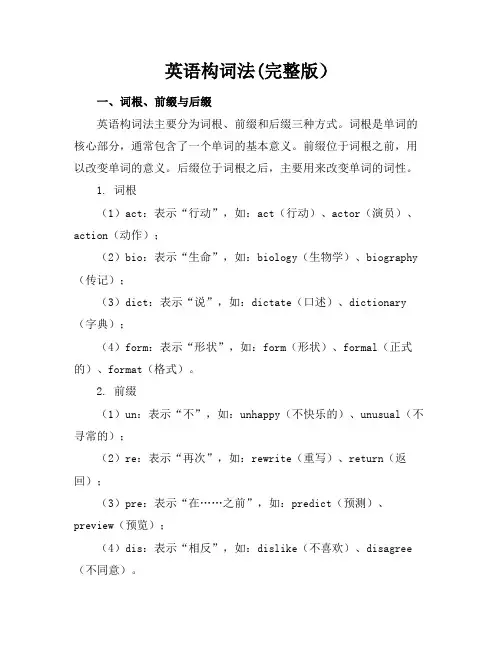
英语构词法(完整版)一、词根、前缀与后缀英语构词法主要分为词根、前缀和后缀三种方式。
词根是单词的核心部分,通常包含了一个单词的基本意义。
前缀位于词根之前,用以改变单词的意义。
后缀位于词根之后,主要用来改变单词的词性。
1. 词根(1)act:表示“行动”,如:act(行动)、actor(演员)、action(动作);(2)bio:表示“生命”,如:biology(生物学)、biography (传记);(3)dict:表示“说”,如:dictate(口述)、dictionary (字典);(4)form:表示“形状”,如:form(形状)、formal(正式的)、format(格式)。
2. 前缀(1)un:表示“不”,如:unhappy(不快乐的)、unusual(不寻常的);(2)re:表示“再次”,如:rewrite(重写)、return(返回);(3)pre:表示“在……之前”,如:predict(预测)、preview(预览);(4)dis:表示“相反”,如:dislike(不喜欢)、disagree (不同意)。
3. 后缀(1)ness:表示“状态”,如:happiness(幸福)、sadness (悲伤);(2)ful:表示“充满”,如:hopeful(充满希望的)、careful(小心翼翼的);(3)ly:表示“副词”,如:quickly(迅速地)、slowly(慢慢地);(4)tion:表示“动作、状态”,如:action(动作)、invention(发明)。
二、合成法与派生法在英语构词法中,除了词根、前缀和后缀,还有合成法和派生法两种重要的构词方式。
这些方法丰富了英语词汇,使得表达更加精确和多样。
1. 合成法(1)名词+名词:如:snowfall(降雪)、bookstore(书店);(2)名词+形容词:如:worldwide(全世界的)、citywide(全市的);(3)形容词+形容词:如:darkblue(深蓝色的)、lightgreen (浅绿色的);(4)动词+副词:如:lookup(查阅)、takeover(接管)。
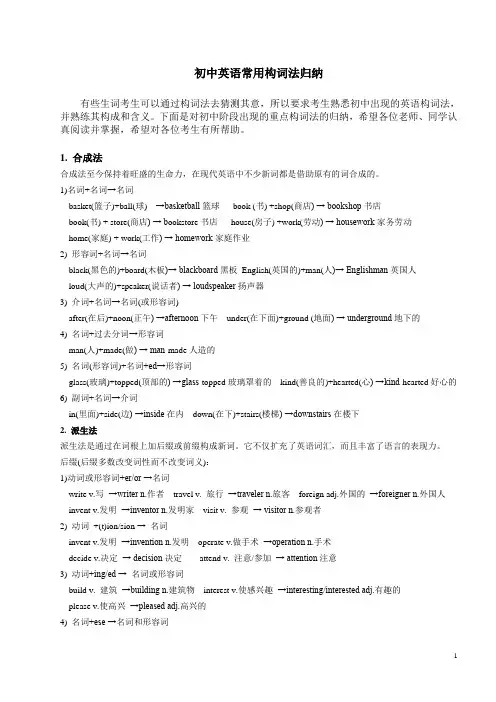
初中英语常用构词法归纳有些生词考生可以通过构词法去猜测其意,所以要求考生熟悉初中出现的英语构词法,并熟练其构成和含义。
下面是对初中阶段出现的重点构词法的归纳,希望各位老师、同学认真阅读并掌握,希望对各位考生有所帮助。
1. 合成法合成法至今保持着旺盛的生命力,在现代英语中不少新词都是借助原有的词合成的。
1)名词+名词→名词basket(篮子)+ball(球)→basketball篮球book (书) +shop(商店) → bookshop书店book(书) + store(商店) → b ookstore书店house(房子) +work(劳动) → housework家务劳动home(家庭) + work(工作) → homework家庭作业2) 形容词+名词→名词black(黑色的)+board(木板)→ blackboard黑板English(英国的)+man(人)→ Englishman英国人loud(大声的)+speaker(说话者) → loudspeaker扬声器3) 介词+名词→名词(或形容词)after(在后)+noon(正午) →afternoon下午under(在下面)+ground (地面) → underground地下的4) 名词+过去分词→形容词man(人)+made(做) → man-made人造的5) 名词(形容词)+名词+ed→形容词glass(玻璃)+topped(顶部的) →glass-topped玻璃罩着的kind(善良的)+hearted(心) →kind-hearted好心的6) 副词+名词→介词in(里面)+side(边) →inside在内down(在下)+stairs(楼梯) →downstairs在楼下2. 派生法派生法是通过在词根上加后缀或前缀构成新词。
它不仅扩充了英语词汇,而且丰富了语言的表现力。
后缀(后缀多数改变词性而不改变词义):1)动词或形容词+er/or →名词write v.写→writer n.作者travel v. 旅行→traveler n.旅客foreign adj.外国的→foreigner n.外国人invent v.发明→inventor n.发明家visit v. 参观→ visitor n.参观者2) 动词+(t)ion/sion → 名词invent v.发明→invention n.发明operate v.做手术→operation n.手术decide v.决定→ decision决定attend v. 注意/参加→ attention注意3) 动词+ing/ed → 名词或形容词build v. 建筑→building n.建筑物interest v.使感兴趣→interesting/interested adj.有趣的please v.使高兴→pleased adj.高兴的4) 名词+ese →名词和形容词China n.中国→Chinese n.中国人adj.汉语的Japan n. 日本→Japanese n. 日本人adj.日语的5) 名词或动词+ ful →形容词help n. 帮助→helpful adj有帮助的use n. 使用→ useful adj. 有用的6) 动词+able → 形容词enjoy v. 喜欢→enjoyable. adj.有趣的forget v. 忘记→ forgettable adj. 容易被忘的7) 名词+en →形容词wool n. 羊毛→woolen adj.羊毛的wood n. 木材→wooden adj.木制的8) 名词+y → 形容词sun n. 太阳→sunny adj.阳光灿烂的cloud n. 云→ cloudy adj.多云的luck n. 运气→ lucky adj.运气好的noise n. 响声→noisy adj.喧闹的smell n. 味道,气味→smelly adj. 有使人难受的气味的,臭的9)形容词+ly →副词happy adj 高兴的→happily adv. 高兴地wide adj. 宽广的→widely adv. 宽广地10) 形容词+ness → 名词good adj. 好的→goodness n.好意kind adj. 善良的→kindness n.和蔼happy adj. 开心的→happiness n. 开心11) 名词+ly →形容词friend n. 朋友→friendly adj.友好的love n. 爱→lovely adj.可爱的12) 名词+ less →形容词(词义与加ful相反)care + less →careless adj. 粗心的help + less →helpless adj. 无助的13) 名词+ al →形容词nation n.民族→national adj. 国家的education n.教育→educational adj.教育性的tradition n. 传统→traditional adj. 传统的14) 名词+ ist →名词science n.科学→scientist n.科学家piano n.钢琴→pianist n.钢琴家tour n. 旅游,观光旅行→tourist n. 旅行者,观光客15) 动词+ ment →名词develop v.发展→development n.发展agree v.同意→agreement n. 同意,一致, 协议argue v. 争论,辩论→argument n. 争吵;论据16) 形容词+ ity →名词able adj. 能够的→ability n.能力,才能possible adj.可能的→possibility n. 可能性real adj. 真的,真实的→reality n. 现实,实际,真实17) 名词+ous →形容词danger n.危险→dangerous adj.危险的18) 名词+ish →形容词fool n. 愚人,傻瓜→foolish adj.愚蠢的,傻的child n.孩子→childish adj.孩子气的,幼稚的book n. 书→bookish adj.书生气的19) 形容词或名词+en →动词wide adj. 广泛的,宽阔的→widen v. 弄宽sharp adj. 锋利的,急剧的→sharpen v. 使...尖锐,变为锐利fright n. 惊吓→frighten v. 使惊吓, 害怕,惊恐20) 名词或形容词+ify →动词beauty n.美丽→beautify v. 美化,变美,修饰simple adj.简单的→simplify v. 简化,使单纯21) 形容词+ize →动词real adj. 真的,真实的→realize v.了解, 实现, 察觉;领悟memory n.记忆力→memorize v.记忆22) 动词+tive →形容词act v. 行为,行动→active adj. 积极的,主动的attract v. 吸引,有吸引力→attractive adj. 有吸引力的,引起注意的23)动词+ess →名词(女性)host v.主持,做东→hostess n. 女主人act v. 行动,扮演→actress n. 女演员wait v.等待,等候→waitress n. 女侍者,女服务员前缀(前缀一般只改变词的意思而不改变其词性):1) un- (不,非,表示否定,形容词前缀)happy (高兴的) → unhappy(不高兴的)like (像) → unlike(不像)2) im- (不,无,非,表示否定,形容词前缀,常用在p, b, m开头的单词前)possible (可能的) → impossible(不可能的)polite → impolite3) in- (不,无,非,表示否定,形容词前缀)active →inactivecomplete →incomplete 不完全的4) dis-(不,非,表示否定,动词或形容词或名词前缀)honest →dishonest agree →disagreeadvantage优势→disadvantage不利,不利条件5) mis- (表示错误)understand →misunderstand (误解)mistake (错误), misuse (误用)6) re- (再,重复)tell 叙述→ retell复述build 建筑→ rebuild 重建write →rewrite7) bi- (两个、双边的)bicycle 自行车, bicolor 双色的8) inter- (相互、交互、在一起)interview, international, internet9) tele- (远)telephone, television10) kilo- (千)meter 米→kilometer 公里,千米gram 克→kilogram 千克11) micro- (微,小)microwave oven 微波炉microcomputer 微型电脑12) sub- (下,次,亚,准,副)subway 地铁,sub-zero 零度以下的,subcollege 准大学程度的,subworker 助手,副手,suboffice 分办事处,3. 转化法在英语发展过程中,由于词尾的基本消失,衍生出一种新的构词法——转化法,而无须借助词缀,就实现词类的转化。

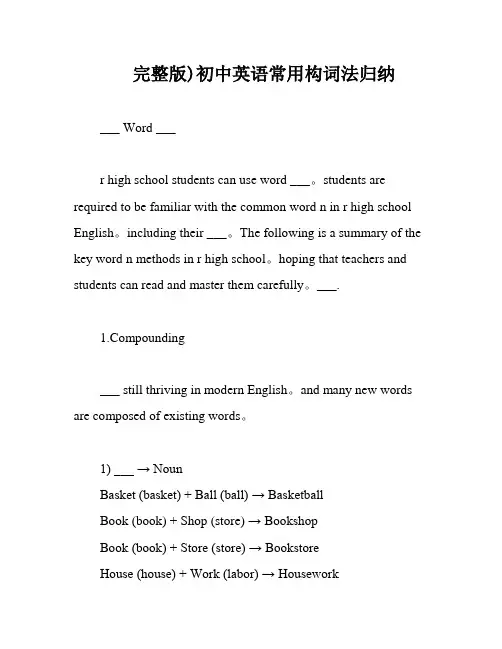
完整版)初中英语常用构词法归纳___ Word ___r high school students can use word ___。
students are required to be familiar with the common word n in r high school English。
including their ___。
The following is a summary of the key word n methods in r high school。
hoping that teachers and students can read and master them carefully。
___.pounding___ still thriving in modern English。
and many new words are composed of existing words。
1) ___ → NounBasket (basket) + Ball (ball) → BasketballBook (book) + Shop (store) → BookshopBook (book) + Store (store) → BookstoreHouse (house) + Work (labor) → HouseworkHome (home) + Work (work) → Homework2) Adjective + Noun → NounBlack (black) + Board (board) → Blackboard English (British) + Man (person) → Englishman Loud (loud) + Speaker (speaker) → Loudspeaker3) ___ → Noun (or Adjective)After (after) + Noon (noon) → AfternoonUnder (under) + Ground (ground) → Underground4) Noun + Past Participle → AdjectiveMan (person) + Made (made) → Man-made5) Noun (Adjective) + Noun + ed → Adjective Glass (glass) + Topped (topped) → pedKind (kind) + Hearted (heart) → Kind-hearted6) Adverb + Noun → nIn (inside) + Side (side) → InsideDown (down) + Stairs (stairs) → Downstairs2.___n is the process of adding suffixes or prefixes to the root of a word to form a new word。

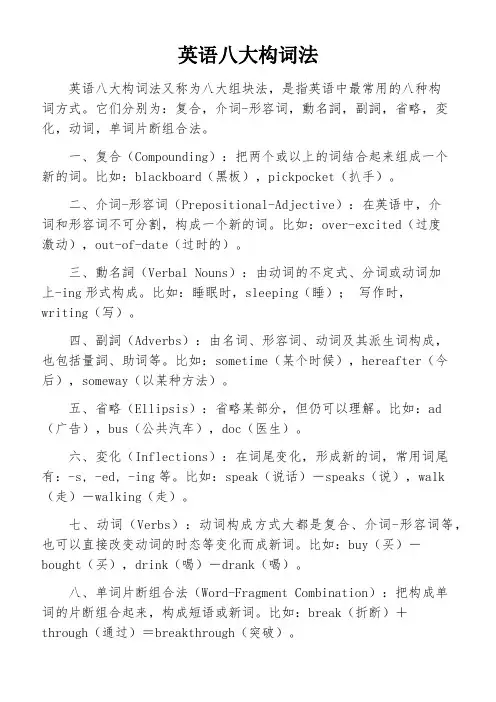
英语八大构词法英语八大构词法又称为八大组块法,是指英语中最常用的八种构词方式。
它们分别为:复合,介词-形容词,動名詞,副詞,省略,変化,动词,单词片断组合法。
一、复合(Compounding):把两个或以上的词结合起来组成一个新的词。
比如:blackboard(黑板),pickpocket(扒手)。
二、介词-形容词(Prepositional-Adjective):在英语中,介词和形容词不可分割,构成一个新的词。
比如:over-excited(过度激动),out-of-date(过时的)。
三、動名詞(Verbal Nouns):由动词的不定式、分词或动词加上-ing形式构成。
比如:睡眠时,sleeping(睡);写作时,writing(写)。
四、副詞(Adverbs):由名词、形容词、动词及其派生词构成,也包括量詞、助词等。
比如:sometime(某个时候),hereafter(今后),someway(以某种方法)。
五、省略(Ellipsis):省略某部分,但仍可以理解。
比如:ad (广告),bus(公共汽车),doc(医生)。
六、変化(Inflections):在词尾变化,形成新的词,常用词尾有:-s, -ed, -ing等。
比如:speak(说话)-speaks(说),walk (走)-walking(走)。
七、动词(Verbs):动词构成方式大都是复合、介词-形容词等,也可以直接改变动词的时态等变化而成新词。
比如:buy(买)-bought(买),drink(喝)-drank(喝)。
八、单词片断组合法(Word-Fragment Combination):把构成单词的片断组合起来,构成短语或新词。
比如:break(折断)+through(通过)=breakthrough(突破)。
英语八大构词法是一种有效的英语学习方法,使用者能够更全面、更系统的了解和掌握单词的构成方式和意思,从而更好地提高学习英语的效率。
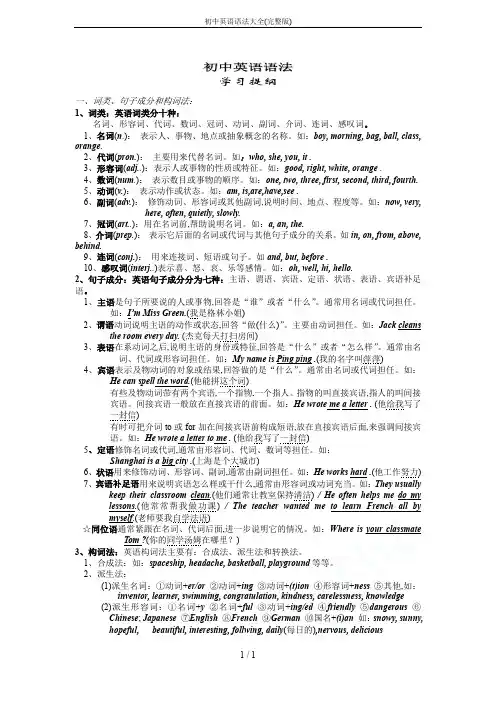
学习提纲一、词类、句子成分和构词法:1、词类:英语词类分十种:名词、形容词、代词、数词、冠词、动词、副词、介词、连词、感叹词。
1、名词(n.):表示人、事物、地点或抽象概念的名称。
如:boy, morning, bag, ball, class, orange.2、代词(pron.):主要用来代替名词。
如:who, she, you, it .3、形容词(adj..):表示人或事物的性质或特征。
如:good, right, white, orange .4、数词(num.):表示数目或事物的顺序。
如:one, two, three, first, second, third, fourth.5、动词(v.):表示动作或状态。
如:am, is,are,have,see .6、副词(adv.):修饰动词、形容词或其他副词,说明时间、地点、程度等。
如:now, very,here, often, quietly, slowly.7、冠词(art..):用在名词前,帮助说明名词。
如:a, an, the.8、介词(prep.):表示它后面的名词或代词与其他句子成分的关系。
如in, on, from, above, behind.9、连词(conj.):用来连接词、短语或句子。
如and, but, before .10、感叹词(interj..)表示喜、怒、哀、乐等感情。
如:oh, well, hi, hello.2、句子成分:英语句子成分分为七种:主语、谓语、宾语、定语、状语、表语、宾语补足语。
1、主语是句子所要说的人或事物,回答是“谁”或者“什么”。
通常用名词或代词担任。
如:I’m Miss Green.(我是格林小姐)2、谓语动词说明主语的动作或状态,回答“做(什么)”。
主要由动词担任。
如:Jack cleansthe room every day. (杰克每天打扫房间)3、表语在系动词之后,说明主语的身份或特征,回答是“什么”或者“怎么样”。
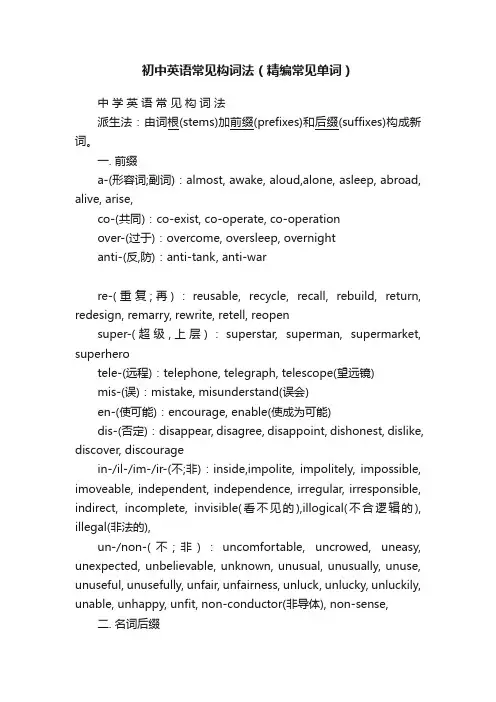
初中英语常见构词法(精编常见单词)中学英语常见构词法派生法:由词根(stems)加前缀(prefixes)和后缀(suffixes)构成新词。
一. 前缀a-(形容词;副词):almost, awake, aloud,alone, asleep, abroad, alive, arise,co-(共同):co-exist, co-operate, co-operationover-(过于):overcome, oversleep, overnightanti-(反,防):anti-tank, anti-warre-(重复;再):reusable, recycle, recall, rebuild, return, redesign, remarry, rewrite, retell, reopensuper-(超级,上层):superstar, superman, supermarket, superherotele-(远程):telephone, telegraph, telescope(望远镜)mis-(误):mistake, misunderstand(误会)en-(使可能):encourage, enable(使成为可能)dis-(否定):disappear, disagree, disappoint, dishonest, dislike, discover, discouragein-/il-/im-/ir-(不;非):inside,impolite, impolitely, impossible, imoveable, independent, independence, irregular, irresponsible, indirect, incomplete, invisible(看不见的),illogical(不合逻辑的), illegal(非法的),un-/non-(不;非):uncomfortable, uncrowed, uneasy, unexpected, unbelievable, unknown, unusual, unusually, unuse, unuseful, unusefully, unfair, unfairness, unluck, unlucky, unluckily, unable, unhappy, unfit, non-conductor(非导体), non-sense,二. 名词后缀-er(…者):customer, leader, manager, officer, partner, ruler, stranger, climber, keeper, maker, owner, banker, reporter, teenager, winner, foreigner, thinker, swimmer, traveller, worker, teacher, reader, listener, speaker, cleaner, helper, waiter, player, singer, dancer, driver, writer, runner, beginner, passenger, lover, skier, murderer, learner, printer, researcher, Londoner, New Yorker -or(器具;…者):actor, competitor, visitor, professor, doctor, director, collector, instructor(教员)备注一:通常加“-er/-or ”多为“男性”,加“-ess”多为“女性”waiter男招待, waitress女服务员, actor男演员, actress女演员, lawyer律师, lawyeress女律师, prince王子, princess 公主备注二:从主动,被动上来看,加“-er\-or”为主动,加“-ee ”为被动examiner 主考人,监考员 examinee 参加考试者,受试人(被监考者) employer 雇主(雇佣别人) employee雇员(被雇佣)interviewer会见者 interviewee 被接见者,被访问者-ese(…地方的人):Chinese, Japanese-ian(精通…的人;…地方的人):musician, magician, historian, physician, technician-ist(专业人员):artist, pianist, tourist, terrorist, physicist, scientist, socialist, journalist(新闻记者), dentist, instrumentalist -ment(性质;状态):government, instrument, achievement, amusement, excitement, improvement, movement, argument, development, agreement-ion:discussion, expression, decision-dom(…范围):freedom, kingdom-ness(性质;状态):business, happiness, shyness, illness, kindness, carelessness, sickness, fairness, unfairness, godness, hardness, forgetfulness, darkness-ship:friendship, relationship, leadership, hardship(困苦)-tion(动作;过程;结果):pollution, suggestion, invention, action, examination, graduation, pronunciation, communication, competition, conversation, satisfaction, education, organization, location, protection, relation, preparation, resolution, collection, operation, impression-hood(…关系,…状况):childhood, neighborhood, brotherhood, sisterhood-th(某种状况或性质):growth, warmth, truth, death, health, length, strength-ty(…性):safety, activity-ce(…性):importance, difference, confidence, dependence, independence, silence, performance-boy, -girl, -man, -woman(表示人的词来构词):cowboy牛仔, playboy花花公子, salesgirl女店员, salesperson 推销员, workman产业工人, postman邮递员, workwomen劳动妇女三. 形容词后缀-t:important, different, confident, dependent, independent, silent-al:international, educational, national, historical, medical, musical, professional, social, typical, normal, personal, physical, traditional, accidental, central, environmental, general -an:American, European, Canadian, Italian, Australian, Indian-ern:southern, northern, eastern, western, modern-ful:helpful, harmful, painful, thankful, peaceful, successful, truthful, awful, cheerful, grateful, useful, careful, wonderful, forgetful, hopeful, colorful, beautiful-ary:secondary, imaginary-able/ible:reasonable, horrible, believable, unbelievable, mobile, valuable, disable, available, comfortable, terrible,possible, impossible, enjoyable, moveable, imoveable, workable, countable, uncountable, eatable-ish:foolish, childish, swedish(瑞典的), British, English-ive:active, creative, native, expensive-y:windy, sunny, cloudy, rainy, wealthy, dirty, sleepy, healthy, hairy, icy, noisy, foggy-less:careless, homeless, meaningless, useless, colorless, helpless, hopeless, motherless-ous:serious, humorous, famous, dangerous, courageous, continuous-tic:scientific, fantastic-en:wooden, fallen, golden-ing(修饰物):interesting, exciting, boring, tiring, surprising -ed(修饰人):interested, excited, bored, tired, surprised四. 动词、副词和数词后缀-fy(使…化):simplify, beautify, satisfy, electrify-en(使…变得):strengthen, lengthen, widen, fatten, blacken, thicken, quicken, harden, soften, weaken-ize(使…成为):realize (实现), modernize, organize-ly(方式;程度):freely, exactly, lastly, normally, politely, impolitely, wisely, actually, specially, especially, heavily, mostly, recently, simply, suddenly, beautifully, cheaply, clearly, comfortably, finally, loudly, probably, quietly, quickly, seriously, weekly, badly, terribly, perfectly, truly, angrily, carefully, hardly, completely, slowly, kindly, nearly, really, usually, happily, easily -ward(s)(方向):towards, backward, eastward, forward-teen(十):fourteen, fifteen, eighteen-ty(整十位数):twenty, forty, thirty-th(序数词):twelfth, fifth, eighth, ninth, twentieth五. 截短法:单词缩写,词义和词性保持不变的英语构词法称为截短法,主要有截头,去尾,截头去尾等形式。
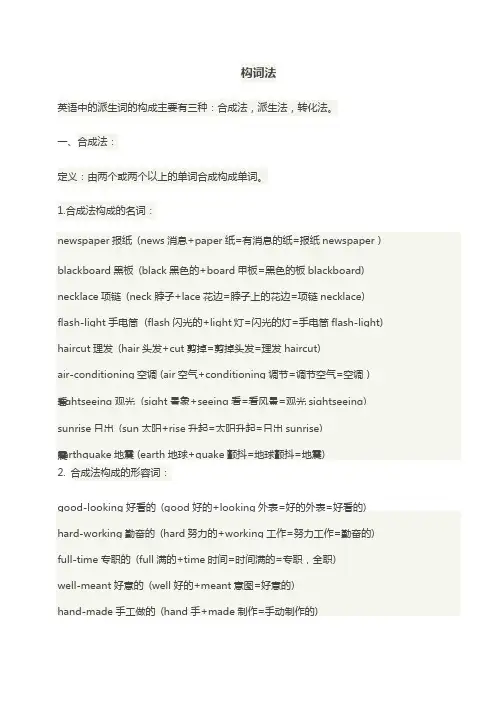
构词法英语中的派生词的构成主要有三种:合成法,派生法,转化法。
一、合成法:定义:由两个或两个以上的单词合成构成单词。
1.合成法构成的名词:2.合成法构成的形容词:3.合成法构成的动词:4.合成法构成的副词:5.合成法构成的代词:二、派生法:定义:指一个词根加上前缀或后缀构成的单词。
1.前缀1)表示否定或相反意思的前缀:dis-:disappear消失dislike不喜欢discover发现disobey不遵从disbelieve 不相信dishonest不诚实的disadvantage (n.) 不利条件,缺点in-:In-: indirection间接的invisible看不见的inaccurate不准确的incorrect不正确的incapable不能的incomparable无比的insensitive对...没有感觉的,感觉迟钝的Im-:impossible不可能的impolite 无礼的immoral 不道德的impassive 无动于衷的immortal 不朽的immutable 不变的un-:unhappy不高兴的unfair不公平的unable不能unpleasant不满意的uncommon不常见的unsuccessful不成功的unhealthy不健康的unfortunate不幸的 il-:illegal违法的, 不合规定的illimitable 无限的 illogical 不合逻辑的ir- :irregular 不规则的irrelative 无关的irresolute 无决断力的irresistible不可抗拒的2)re-前缀:表示“重新,再”re-: rebuild 重新建造recycle再循环reconsider 重新考虑review 复习recall回想····recollect回忆····reunion团圆,重聚reconstruction重建3)pre-前缀:表示“….前的,预先”preschool 学龄前的prehistory 史前prepay 预付precaution 预防措施4)sub-前缀:表示“在下面,次一等,副手”subtitle副标题suboffice分办事处subtropics亚热带submerge沉没,淹没5)Inter-前缀:表示“在…之间,相互”international国际的interaction相互影响interrelate相互关连intersect横断2.后缀1)形容词后缀-able (n./v.→adj.)表示“可以……的;显示……性质”。
初中英语构词法基本知识讲解在英语中,一个单词往往与耳它词在结构上有联系!把S些联系的规律总结出来就是构词法°构词刖方法主婪有派生、转化和合成等三种.泯生袪在一个单词前或词尾加上一个词蟹,从而变成一个新词的方袪叫做派生法.加在单词前的词銀叫前囊,加在单词后的词蠶呱后織.1.靴法是指基本不改变单帥词形,而額转用为另—词类讯单词转化后艙义常与械前的意义有密切的联氟May I have a look ?拢可以看-看吗?(动词转化为名诩Let him have a try.让他试试.(动词转化为名词)Can we book the tickets ahead?我们能探前定票吗?(名词转化炯诩The hall can seat thousands of people.大斤能坐数千人.(名词转化为动词)She had to busy herself with housevoik.她不得不忙于冢务活。
(形容词转化成动词)lou d better eiopty the bottle first.你最好把瓶子先倒空.(名词转化九动词)It' $ necessary to know the difference between ght and vzong.有必娶知道对错之间时区别。
(形容词转化戚名词)They often help the poor.他们经常帮助穷人。
(形容词转化成名词)Ve began to drive jjoith.我们刑冶向北行驶.(名词转化成副词)There veie lots of ups and dovns in his life.他的一生中有许多的起起落落。
(副词轉化成名词)合成袪把两个或两个以上的单词合成为一个单词,这种构词法咸为合成?1.令成形容词He is a Khdte~collai clerk.他是一名白领职员.He is an open^mded leader.他是—名思想刑I的领导<■Wiat a Jcijid-hearted girl!多么好心册女孩!This is a good-loahng a table.这是一张好看的桌子-Taking a taxi is tijsesavin^.乘坐出租车很省时。
初中英语构词法大全英语构词方法主要有三种:即合成、派生和转化。
一. 转化英语单词的词性非常活跃,名词用作动词,动词转化为名词,形容词用作动词等现象非常普遍,这种把一种词性用作另一种词性的方式就叫做词性的转化。
阅读中经常出现转化词,只要抓住单词的原始意思,结合句子成分,就容易弄清它们的引申义。
1. 动词和名词之间的相互转化。
有时意思变化不大,有时有一定的变化。
1) 动词转化为名词。
如:Shall we go out for a drive next Sunday?下个星期天咱们出去驱车旅行,好吗?句中的drive由动词转化为名词(词意引申为“驱车旅行”)。
I often go there for a walk.我经常去那里散步。
(句中walk由动词转化为名词)2) 名词转化为动词。
如:Have you booked your ticket?你的票订好了吗?(句中book由名词转化为动词,词意引申为“订购”)Hand me your knife, please.请把你的刀子递给我。
(句中hand由名词转化为动词,词意引申为“传递”)2. 少部分形容词转化为动词。
The train slowed down to half its speed.火车速度减慢了一半。
(句中slow由形容词转化为动词,词意引申为“减速”)Don't dirty your clothes.别把你的衣服弄脏了。
(句中dirty由形容词转化为动词,词意引申为“弄脏”)3. 形容词和名词之间的相互转化。
The poor were not allowed to go into this park those days .那个时候,穷人是不允许进入这个公园的。
(句中poor由形容词转化为名词,词意引申为“穷人”)They took the sick to hospital yesterday.昨天他们把那个病人送进了医院。
(句中sick由形容词转化为名词,词意引申为“病人”)4. 有些词可以词形不变,只因重音变化而发生词类转化,有时词义也可能变化。
英语构词通常包括六种方法:转化法、派生法、合成法、混合法、截短法和首尾字母结合法。
一、【派生法】英语构词法中在词根前面加前缀或在词根后面加后缀,从而构成一个与原单词意义相近或截然相反的新词的方法叫作派生法。
1.前缀除少数英语前缀外,前缀一般改变单词的意义,不改变词性;英语后缀一般改变词类,而不引起词义的变化。
(1)表示否定意义的前缀常用的有dis-, il-, im-, in-, ir-, mis-, non-, un-等,在单词的前面加这类前缀常构成与该词意义相反的新词。
例如:agree同意→disagree不同意fair公平的→unfair不公平的possible可能的→impossible不可能的understand理解→misunderstand误解(2)表示其他意义的前缀常用的有a-(多构成表语形容词), anti- (反对;抵抗), auto- (自动), co- (共同), en- (使), inter- (互相), re- (再;又), sub- (下面的;次;小), tele- (强调距离)等。
例如:co-worker 同事,帮手enlarge 使变大cooperate 合作rewrite 重写subway 地铁2.后缀给单词加后缀也是英语构词的一种重要方法。
后缀通常会改变单词的词性,构成意义相近的其他词性;少数后缀还会改变词义,变为与原来词义相反的新词。
下面仅作简单介绍。
(1)构成名词的后缀常用的有-ence,-(e)r/ -or (从事某事的人),-ese (某地人),-ess (雌性),-ian (精通……的人),-ist (专业人员),-ment (性质;状态),-ness (性质;状态),-tion(动作;过程)等。
例如:differ不同于→difference区别write写→writer作家China中国→Chinese中国人act表演→actress女演员music音乐→musician音乐家(2)构成动词的后缀常用的有-(e)n (多用于形容词之后),-fy (使……化),-ize (使……成为)。
英语8种构词法总结派生法(在词根的前面或后面加上某个词缀)、合成法(由两个或两个以上的词合成一个新词)、转换法(在词形不变的情况下,一个单词由一种词性转换成另一种词性)。
构词法主要有三种:派生法、合成法和转换法。
一、派生法在一个词的词根(root)的前面或后面加上某个词缀来产生新词,这种构词法称为派生法(derivation)。
加在前面的词缀叫前缀(prefix),加在后面的词缀叫后缀(suffix)。
(一)后缀:许多名词、形容词、副词和动词是由词根加后缀构成的。
1.构成名词的常用后缀有:(1)-er,-or,-ist,-ee,-ese,-ant等用于构成表示人或物的名称。
例如:thinker(思想家),guesser(猜想者),translator(翻译者),conductor(导体);physicist(物理学家),dentist (牙科医生);employee(雇员),trainee (受训人员);physician(内科医生),Italian (意大利人);Japanese(日本人); assistant(助手)等。
(2) -ance, -ence, -(a)tion, -sion, -ics, -ing, -ity, -ment, -ness, -th, -ty,-ure,-ship等用于构成表示行为、性质、状态等抽象名词。
例如:acceptance(接受),assistance (帮助); dependence(依靠),confidence(信心);repetition (重复),preparation(准备); discussion(讨论),division (分开);physics (物理学),fabrics (纺织品); building (建筑物),wedding (婚礼);reality (现实),ability (能力); settlement(解决),argument (争论);greatness (伟大),hardness (硬度); warmth (温暖),length (长度);safety (安全),penalty (惩罚); failure (失败),pressure (压力);friendship(友谊),leadership(领导)等。
初中英语构词法--英语单词不在困难
英语构词方法主要有三种:即合成、派生和转化。
1
转化
英语单词的词性非常活跃,名词用作动词,动词转化为名词,形容词用作动词等现象非常普遍,这种把一种词性用作另一种词性的方式就叫做词性的转化。
阅读中经常出现转化词,只要抓住单词的原始意思,结合句子成分,就容易弄清它们的引申义。
1. 动词和名词之间的相互转化。
有时意思变化不大,有时有一定的变化。
1) 动词转化为名词。
如:
下个星期天咱们出去驱车旅行,好吗?
句中的drive由动词转化为名词(词意引申为“驱车旅行”)。
我经常去那里散步。
(句中walk由动词转化为名词)
2) 名词转化为动词。
如:
你的票订好了吗?
(句中book由名词转化为动词,词意引申为“订购”)
请把你的刀子递给我。
(句中hand由名词转化为动词,词意引申为“传递”) 2. 少部分形容词转化为动词。
火车速度减慢了一半。
(句中slow由形容词转化为动词,词意引申为“减速”)
(句中dirty由形容词转化为动词,词意引申为“弄脏”)
3. 形容词和名词之间的相互转化。
那个时候,穷人是不允许进入这个公园的。
(句中poor由形容词转化为名词,词意引申为“穷人”)
昨天他们把那个病人送进了医院。
(句中sick由形容词转化为名词,词意引申为“病人”)
4. 有些词可以词形不变,只因重音变化而发生词类转化,有时词义也可能变化。
如:
record [reˈkɔːd] v.记录record [rɪˈkɔːd] n.记录
5. 有些词词形不变,只因词尾的清浊音变化而发生词类转化,有时词形也可以变化。
如:
excuse [ɪksˈkjuːz] v.原谅excuse [ɪksˈkjuːs] n.原谅
use [juːz] v.用use [juːs] n.用
2
派生
派生词是在一个单词前面加前缀或后面加后缀构成新词。
如:happy—unhappy (加前缀un-)
happy—happily (加后缀-ly)
1. 通过加前缀构成另一个词。
前缀一般不造成词类的转换,但能引起词义的变化。
前缀中有相当一部分可构成反义词。
常用的前缀有:
个别前缀也可以引起词类的变化,如:
en-可以和名词或形容词构成动词:enlarge(扩大), enable(使能够), encourage (鼓励);
a-可以和名词构成形容词:asleep(睡着的);
out-可以和一些动词构成名词:outcome(结果), outlet(出口), outlook(观点)。
2. 通过加后缀构成另一个词。
后缀不仅能改变词义,也能改变词类。
1) 常用的构成名词的后缀:
2) 常用的构成动词的后缀:
3) 常用的构成副词的后缀:
4) 常用的构成形容词的后缀:
5) 数词后缀
3
合成
将两个或两个以上的单词合成在一起而构成的新词,叫做合成词。
合成词在英语中比较活跃,广泛运用在涉及各个领域的语言文字中。
常用的合成词的构成方法如下:
1. 合成形容词常见的构成方法:
2. 合成动词常见的构成方法:
3. 合成名词常见的构成方法:
4. 合成副词或代词。
如:
maybe, forever,
myself, whole-heartedly,
however, everyone, something
5. 有时一个名词可以构成许多合成词。
如:handbag, handball, handwriting, hand-made
考前复习必看。